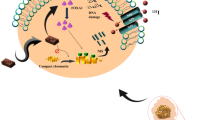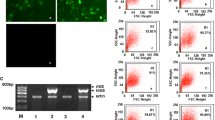Abstract
Purpose
To evaluate the role of p53 in radionuclide gene therapy, we investigated the cytotoxic effect of 131I and 188Re following cotransfection of the sodium iodide symporter (NIS) and wild-type p53 (wt-p53) genes into cancer cells.
Methods
The NIS gene was transfected to human anaplastic thyroid carcinoma cells (ARO) expressing mutant p53 (mt-p53) using liposomes. The uptakes of 125I and 188Re were measured in the transfected (ARO-N) and wild-type cell lines (ARO). A recombinant adenovirus-5 vector containing a CMV promoter and wt-p53 cDNA, called Ad-p53, was established and transduced to ARO and ARO-N cells. After incubating cells with 131I and 188Re, the survival rate of each cell line was measured using a clonogenic assay. For radionuclide gene therapy in an animal model, Ad-p53 was injected directly into ARO and ARO-N tumours which were transplanted to nude mice. Two days later, 188Re or saline was injected intraperitoneally into the mice, and the tumours were measured using a calliper for 4 weeks.
Results
In ARO-N cells, the uptakes of 125I and 188Re were 505.16±21.30 pmol/106 cells and 13,875.20±504.85 cpm/106 cells at 30 min, respectively. There was no difference between the survival rates of ARO cells and ARO-N cells after incubation with 131I or 188Re. When Ad-p53 was transduced to ARO-N cells, the survival rate of wt-p53-expressing ARO-N cells incubated with 131I (18.5 MBq/5 ml) and 188Re (18.5 MBq/5 ml) decreased to 48.8±18.4% and 32.6±23.5%, respectively. In the nude mice experiment, ARO and ARO-N tumours gradually grew up to six to eight times larger than the initial volume. ARO and ARO-N tumours transduced with Ad-p53 continued to grow. However, the ARO-N tumours treated with Ad-p53 and 185 MBq of 188Re regressed to 20% of the initial volume.
Conclusion
Growth of ARO-N tumour treated with 131I or 188Re was significantly inhibited by Ad-p53 transduction in vivo as well as in vitro. Transfection of the NIS gene into human anaplastic thyroid cancer induced the accumulation of beta-emitter radionuclides, and cotransfection with a wt-p53 gene enhanced the cytotoxic effect.







Similar content being viewed by others
References
Shimura H, Haraguchi K, Miyazaki A, Endo T, Onaya T. Iodide uptake and experimental 131I therapy in transplanted undifferentiated thyroid cancer cells expressing the Na+/I− symporter gene. Endocrinology 1997;138:4493–6.
Mandell RB, Mandell LZ, Link CJ Jr. Radioisotope concentrator gene therapy using the sodium/iodide symporter gene. Cancer Res 1999;59:661–8.
Boland A, Ricard M, Opolon P, Bidart JM, Yeh P, Filetti S, et al. Adenovirus-mediated transfer of the thyroid sodium/iodide symporter gene into tumors for a targeted radiotherapy. Cancer Res 2000;60:3484–92.
Dohan O, De la Vieja A, Paroder V, Riedel C, Artani M, Reed M, et al. The sodium/iodide symporter (NIS): characterization, regulation, and medical significance. Endocr Rev 2003;24:48–77.
Chung J-K. Sodium/iodide symporter: its role in nuclear medicine. J Nucl Med 2002;43:1188–200.
Maheshwari YK, Hill CS Jr, Haynie TP 3rd, Hickey RC, Samaan NA. 131I therapy in differentiated thyroid carcinoma: M. D. Anderson Hospital experience. Cancer 1981;47:664–71.
Arturi F, Russo D, Giuffrida D, Schlumberger M. Sodium-iodide symporter (NIS) gene expression in lymph-node metastases of papillary thyroid carcinomas. Eur J Endocrinol 2000;143:623–7.
Smit JW, Shröder-van der Elst JP, Karperien M, Que I, van der Pluijm G, Goslings B, et al. Reestablishment of in vitro and in vivo iodide uptake by transfection of the human sodium iodide symporter (hNIS) in a hNIS defective human thyroid carcinoma cell line. Thyroid 2000;10:939–43.
Nakamoto Y, Saga T, Misaki T, Kobayashi H, Sato N, Ishimori T, et al. Establishment and characterization of a breast cancer cell line expressing Na+/I- symporters for radioiodide concentrator gene therapy. J Nucl Med 2000;41:1898–904.
Haberkorn U, Henze M, Altmann A, Jiang S, Morr I, Mahmut M, et al. Transfer of the human NaI symporter gene enhances iodide uptake in hepatoma cells. J Nucl Med 2001;42:317–25.
Dadachova E, Bouzahzah B, Zuckier LS, Pestell RG. Rhenium-188 as an alternative to iodine-131 for treatment of breast tumors expressing the sodium/iodide symporter (NIS). Nucl Med Biol 2002;29:13–8.
Carlin S, Mairs RJ, Welsh P, Zalutsky MR. Sodium-iodide symporter (NIS)-mediated accumulation of [211At]astatide in NIS-transfected human cancer cells. Nucl Med Biol 2002;29:729–39.
Kawabe S, Munshi A, Zumstein LA, Wilson DR, Roth JA, Meyn RE. Adenovirus-mediated wild-type p53 gene expression radiosensitizes non-small cell lung cancer cells but not normal lung fibroblasts. Int J Radiat Biol 2001;77:185–94.
Siles E, Villalobos M, Valenzuela MT, Nunez MI, Gordon A, McMillan TJ, et al. Relationship between p53 status and radiosensitivity in human tumour cell lines. Br J Cancer 1996;73:581–8.
Sasaki R, Shirakawa T, Zhang ZJ, Tamekane A, Matsumoto A, Sugimura K, et al. Additional gene therapy with Ad5CMV-p53 enhanced the efficacy of radiotherapy in human prostate cancer cells. Int J Radiat Oncol Biol Phys 2001;1:1336–45.
Lopez-Crapez E, Bibeau F, Thezenas S, Ychou M, Simony-Lafontaine J, Thirion A, et al. p53 status and response to radiotherapy in rectal cancer: a prospective multilevel analysis. Br J Cancer 2005;92:2114–221.
Horowitz J. Adenovirus-mediated p53 gene therapy: overview of preclinical studies and potential clinical applications. Curr Opin Mol Ther 1999;1:500–9.
Freytag SO, Kim JH, Brown SL, Barton K, Lu M, Chung M. Gene therapy strategies to improve the effectiveness of cancer radiotherapy. Expert Opin Biol Ther 2004;4:1757–70.
D’Avenia P, Porrello A, Berardo M, Angelo MD, Soddu S, Arcangeli G, et al. Tp53-gene transfer induces hypersensitivity to low doses of X-rays in glioblastoma cells: a strategy to convert a radioresistant phenotype into a radiosensitive one. Cancer Lett 2006;231:102–12.
Lee YJ, Chung JK, Shin JH, Kang JH, Jeong JM, Lee DS, et al. In vitro and in vivo properties of a human anaplastic thyroid carcinoma cell line transfected with the sodium iodide symporter gene. Thyroid 2004;14:889–95.
Lee WW, Lee B, Kim SJ, Moon DH, Lee H. Kinetics of iodide uptake and efflux in various human thyroid cancer cells by expressing sodium iodide symporter gene via a recombinant adenovirus. Oncol Rep 2003;10:845–9.
Hsieh YJ, Ke CC, Liu RS, Wang FH, Tang KT, Chi CW, et al. Radioiodide imaging and treatment of ARO cancer xenograft in a mouse model after expression of human sodium iodide symporter. Anticancer Res 2007;27(4B):2515–22.
Huang M, Batra RK, Kogai T, Lin YQ, Hershman JM, Lichtenstein A, et al. Ectopic expression of the thyroperoxidase gene augments radioiodide uptake and retention mediated by the sodium iodide symporter in non-small cell lung cancer. Cancer Gene Ther 2001;8:612–8.
Heltemes LM, Hagan CR, Mitrofanova EE, Panchal RG, Guo J, Link CJ. The rat sodium iodide symporter gene permits more effective radioisotope concentration than the human sodium iodide symporter gene in human and rodent cancer cells. Cancer Gene Ther 2003;10:14–22.
Lamioki H, Mirzadeh S, Lambrecht RM. 188W/188Re generator for biomedical applications. Radiochem Acta 1994;65:39–46.
Nagayama Y, Yokoi H, Takeda K, Hasegawa M, Nishihara E, Namba H, et al. Adenovirus-mediated tumor suppressor p53 gene therapy for anaplastic thyroid carcinoma in vitro and in vivo. J Clin Endocrinol Metab 2000;85(11):4081–6.
Colletier PJ, Ashoori F, Cowen D, Meyn RD, Tofilon P, Meistrich ME, et al. Adenoviral-mediated p53 transgene expression sensitizes both wild-type and null p53 prostate cancer cell in vitro to radiation. Int J Radiat Oncol Biol Phys 2000;48:1507–12.
Acknowledgments
This work was supported by a Korea Research Foundation Grant funded by the Korean Government (MOEHRD) (KRF-2003-E-00168)
Author information
Authors and Affiliations
Corresponding author
Rights and permissions
About this article
Cite this article
Lee, Y.J., Chung, JK., Kang, J.H. et al. Wild-type p53 enhances the cytotoxic effect of radionuclide gene therapy using sodium iodide symporter in a murine anaplastic thyroid cancer model. Eur J Nucl Med Mol Imaging 37, 235–241 (2010). https://doi.org/10.1007/s00259-009-1251-5
Received:
Accepted:
Published:
Issue Date:
DOI: https://doi.org/10.1007/s00259-009-1251-5




